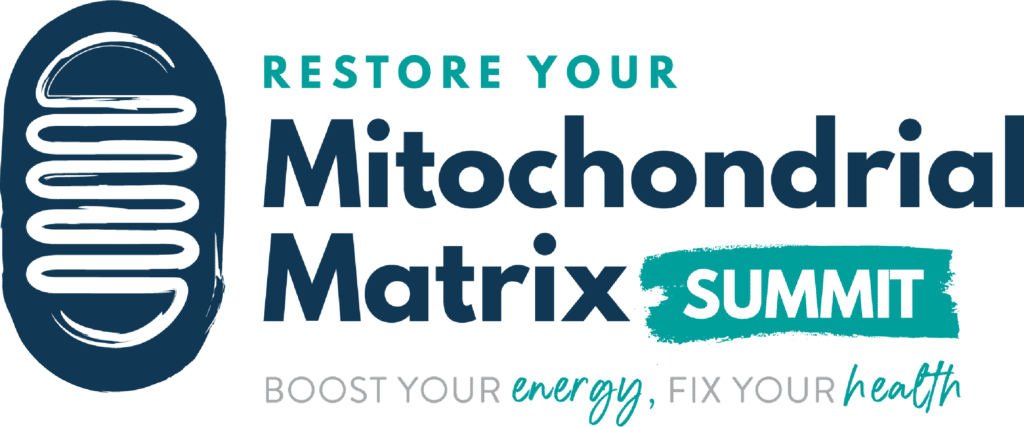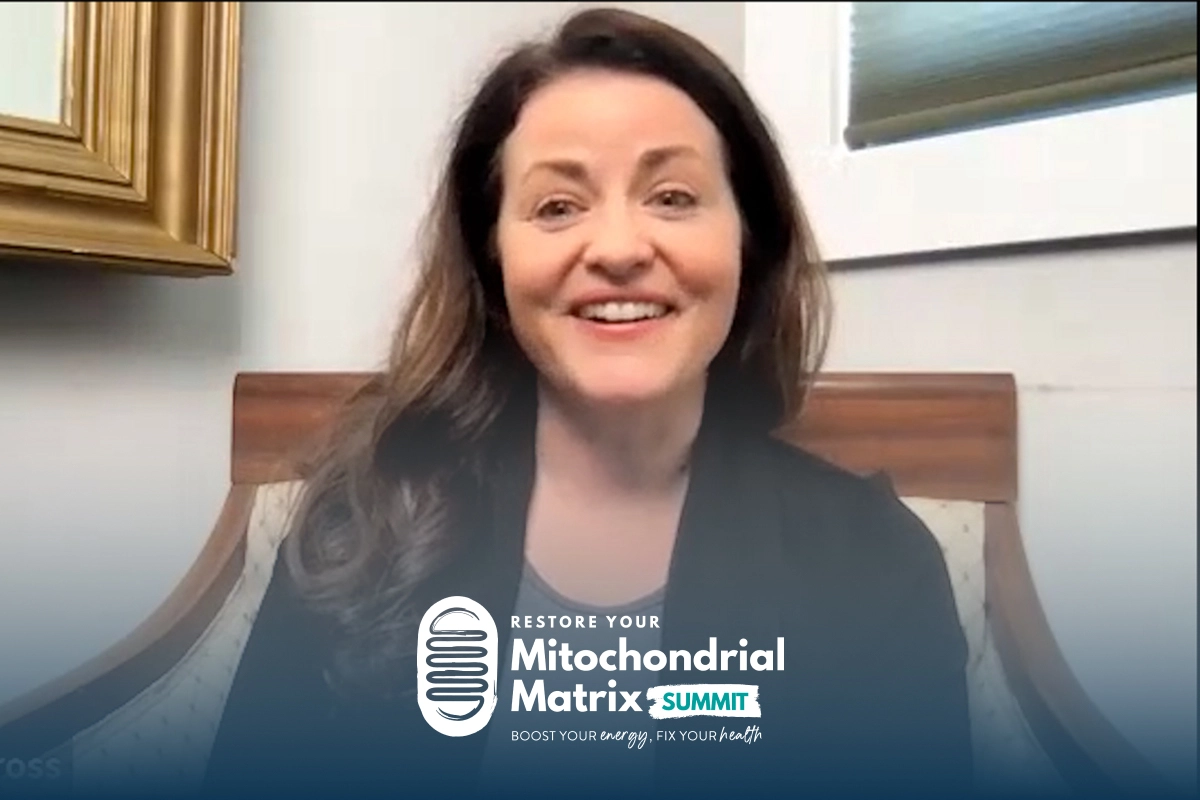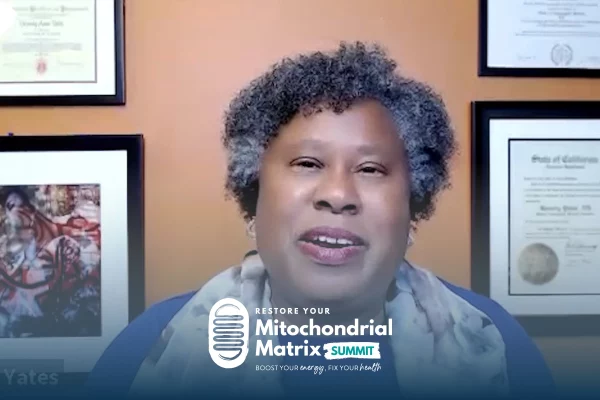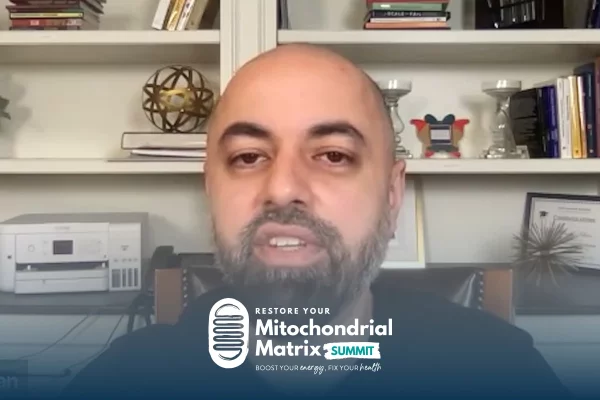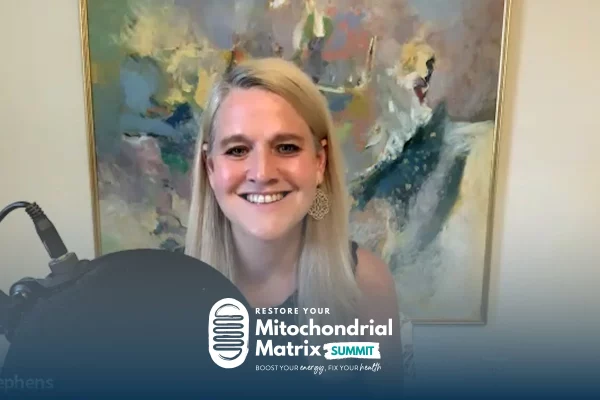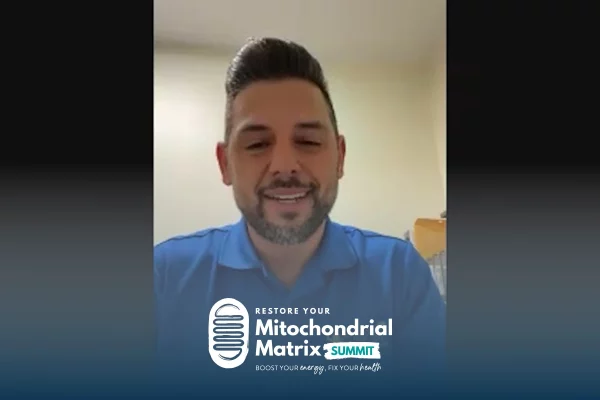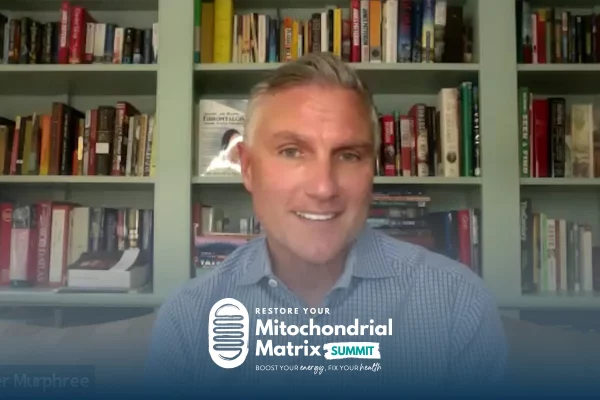Join the discussion below

Laura Frontiero, FNP-BC, has served thousands of patients as a Nurse Practitioner over the last 22 years. Her work in the health industry marries both traditional and functional medicine. Laura’s wellness programs help her high-performing clients boost energy, renew mental focus, feel great in their bodies, and be productive again.... Read More
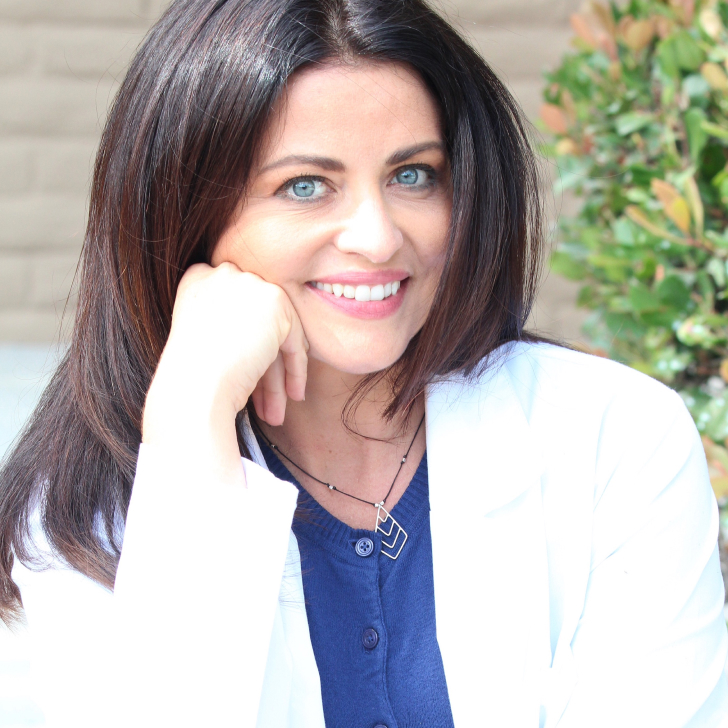
Dr. Jessica Peatross has a passion for uncovering the mystery behind the chronic illness, whether that be stealth infections, heavy metals, stress, trauma or other environmental toxicities. She is visionary for the future of healthcare and left her position as a board-certified, internal medicine hospitalist to pursue Functional Medicine in... Read More
- Review how mitochondria are important in the liver pathways and especially in bile movement
- Learn how the parasympathetic nervous system is connected to healing
- Explore the role of the estrobolome in bile and liver metabolism and leaky gut
Laura Frontiero, FNP-BC
Welcome to another episode of the restore your mitochondrial matrix. I’m your host, Laura Frontiero. I’m bringing you experts to help you boost your energy and fix your health so you can build the life you love. And today my special guest is Dr. Jessica Peatross. Hi, Jess! Welcome to the summit.
Dr. Jessica Peatross
Thanks so much for having me here, Laura. I’m honored.
Laura Frontiero, FNP-BC
Oh, I’m super excited about this talk we’re gonna have, but first let’s tell the audience a little bit about you. Dr. Jess, you are a chronic illness expert and a visionary for the future of healthcare. And you actually left your position as a board certified internal medicine hospitalist to pursue functional medicine. So you could serve your patients better and this is significant everyone. You know, I come from the western medicine world for 20 years as a nurse practitioner. Dr. Jess was working in the hospital. Hospitalist is an intense job. You have to know everything about everything. Life and death is in your hands and you literally walked away from it. It’s probably one of the most respected positions you can be in, in the Western medicine space. So just astounded that you moved into this space and for good reasons.
So you’re known for your ability to help identify the root cause of illness. And we’re talking a lot about root cause on this summit and you teach that it can often be traced back to stealth infections, hidden infections, like Lyme parasites, and mold. So we’ll get into some of that today. And you’re trained in the gerson therapy and functional medicine, nutrigenomics, ozone therapy. You have your own huge practice with a huge waiting list, and you have this amazing membership site where people can get access to real health information and access to doctor advice and everything, 24/7. It’s really amazing. So really excited to bring you here. Can you tell us real quick, just elaborate a little bit more on that story of why you left.
Dr. Jessica Peatross
For sure.
Laura Frontiero, FNP-BC
Your job.
Dr. Jessica Peatross
You know, you said, hey one of the most respected positions out there, but I didn’t respect myself after a while when I was in the position. And that’s, what’s important to me over a time is not, it was I happy and satisfied, and felt like I was truly helping people. And for a long time in the system I did, I drank all the Kool-Aid in medical school. I got my flu shots. I ate cafeteria food. I didn’t see anything wrong with discharging people on 30 medications. And then slowly over time, especially when I moved to the west coast, I just got a different perspective, hanging out with different people and seeing new ways of doing things and maybe better ways than we were doing things. And I just couldn’t keep my mouth shut.
The cracks started to form in the system for me and I just never would’ve made it through medical school if I had seen it earlier, it was supposed to be this way. I would work six years almost in the hospital system. It was at a hospital that everyone knows very popular hospital out there. And I was noticing kind of the factory farm meat and processed dairy and sugar they were feeding cancer patients. I noticed the Coca-Cola and Pepsi contracts in the hospital. I no longer was okay with discharging patients on 40 different medications. When those studies had been done with that much- that many medications before.
And I was writing in the chart that people were putting people on prevacid for six years, rather than changing their diet. So I was really kind of a wild west liability for them and they set me down and they said, you know what? We know the system’s broken. We can’t do anything about it. You really have to shut up or you can’t work for us anymore. And I wasn’t married. I didn’t have kids. So I quit. And the way my personality is, I kind of jump out of the plane and figure out the parachute on the way down. And so it was sort of that same situation, I jumped and then thought, gosh, you know, I thought there was gonna be this ready made system for natural doctors. And there’s not. You have to be your own businesswoman and businessman and a practitioner at the same time. So I kind of learned the hard way.
Laura Frontiero, FNP-BC
And you crushed it. So when we get done with this talk.
Dr. Jessica Peatross
Yeah.
Laura Frontiero, FNP-BC
When we get done with this talk, I want you to tell everybody how to get ahold of you, how to find your programs and get enrolled in what you’re up to, because you can benefit from Dr. Jess without ever even stepping foot in front of her. She’s she’s made it so easy for you to get support online. So we’ll go into that. But today we’re really gonna, I wanna focus, wanna tap into your brain about the importance of liver, gallbladder, the pathways for detox, because this is critical, critical for restoring mitochondrial health, for removing infections, for removing toxins. It all comes down to that. And so we’re gonna get into that. So why don’t we start by you telling us why, you know, people just wanna say, you know, just I did a gut test. I can tell I have leaky gut and I’ve got some overgrowth of bacteria, but why is it important to detox? Why is this the crux of what we’re doing? And if it’s missed, you’re not gonna get better.
Dr. Jessica Peatross
Well, Laura, there’s a lot of different theories about why people get sick. But for me, I will never believe that it’s just something wrong with our genes and that we are powerless to change this. I never will believe that because I’ve seen different anecdotally with, with hundreds of people. And so I have to ask myself, why are people getting sick? And so much more now in modern society? When we have so many more advances than before. What it is, is a toxic society that epigenetically can trigger and change our genes, much like the keys on a piano being pressed or not pressed. And if that’s the case, I have to look at it and say, gosh, I’m more of a subtractionist and health, an additionist. And that means, I think most people are not sick because of what their body is missing.
They are sick because there’s something stuck inside their body that does not belong there. And that is sort of the foundation of what I believe and how I treat people. There’s something stuck inside your body that’s making you imbalanced your immune system is trying, it’s spinning its wheels like a truck stuck in the mud. How can we bring you back to homeostasis? And the way you do that is through detoxing and that, you know, your body naturally has these wonderful , things like the liver, the bile, the bowels, the sweat pathway, then not only close you off, but can release heavy metals and flame retardants. Well, if those things get stuck in your body long enough, they create stagnant drainage pathways, your body can’t get rid of them. So we need to kind of see how the body does it on its own and then help to support that. And make it remember what it always used to know in the first place and any doctor that goes against the body’s way, isn’t that smart, in my opinion.
Laura Frontiero, FNP-BC
I love that. Just say it like it is girl.
Dr. Jessica Peatross
It’s sort of, yeah, I kind of do get myself in trouble with that.
Laura Frontiero, FNP-BC
- So what I’m hearing is detox is really important. We live in an environment where we’re exposed constantly tell us what this does to our mitochondria. And then I wanna get into the signs and symptoms of, you know, liver stagnation, how we know this is a big problem.
Dr. Jessica Peatross
Mitochondria are interesting. They’re the little oblong organs in every cell except red blood cells that produce ATP or energy. So it’s really silly to think that our organs can function properly when the cells that make them up aren’t functioning properly. And so mitochondria also, they come from our returnal side in origin and they have ancient DNA. Unfortunately, this DNA does not have the same repair mechanisms as our regular double helix DNA. And so when it’s injured by things like toxins, heavy metals, trauma, we know these things can happen. They’re published in the studies. How does our DNA in our mitochondria repair, we really need to help with antioxidants because there’s a lot of free, radical release. There’s a lot of mitochondria in things like the brain, the liver, that we’re gonna be talking about today. So if those organs start to get stagnant, full of toxicities, the mitochondria is damaged. You can see how it becomes a snowball rolling down the hill into an avalanche because the body can’t help itself any longer.
Laura Frontiero, FNP-BC
Right? So what I’m hearing is, gotta fix your mitochondria, gotta support those guys if you wanna have successful resolution of health problems, build your immune system, detoxify, get rid of infections. You can’t leave these guys out.
Dr. Jessica Peatross
Absolutely. Absolutely not. They have so many functions, in the body including not just energy but immunity.
Laura Frontiero, FNP-BC
Right? So I’m, assuming that your programs build in mitochondria support to everything that you’re doing.
Dr. Jessica Peatross
1000%, you know, we can’t continue to detox a body if it doesn’t have the energy, the cellular health, all of that needs to be looked at and addressed it can’t just be neglected.
Laura Frontiero, FNP-BC
Of of course. Okay so let’s get in and talk about what are the signs and symptoms of liver stagnation? How might our viewers know that they need some more liver support?
Dr. Jessica Peatross
I love this question. Okay. So the liver, if you guys kind of don’t know where you’re stuck, it there’s an old saying that goes, it’s probably the liver. Just look to the liver and to kind of solidify that point. I will say in my own practice when I was practicing, probably one in three Americans that I saw did have stagnant liver symptoms. And you guys may be thinking, I got liver enzymes, ALT and AST they’re normal on my labs. My bilirubin is normal. Doesn’t that indicate good liver health? And I want you guys to just think, yeah, those labs can be really, really helpful in certain times, but they don’t elicit everything and nothing is perfect. In fact, those labs haven’t changed in about 30 to 50 years.
So I often will see people with liver stagnation symptoms, with normal blood work. And so I wanna kind of give them some hints that there may be something wrong with the liver here, beyond that blood work. Number one. Now, can you guys handle caffeine or coffee? Right? You may say that’s a genetic polymorphism or snip. I can’t process coffee because of this. Guys, you genes aren’t static. You can turn them off or on sometimes with detoxing and removing pathogens and toxicities. So let’s, if you can’t handle caffeine, you turn into a tweaker, you’re super jittery. You’re angry at everyone and irritable. That’s a problem with your liver because it processes the caffeine and coffee. Another one is alcohol. So if you don’t drink, you drink coffee, it kind kind of makes it hard for me to screen you. But alcohol, if you drink one glass of wine and you’re loopy, you start getting itchy, swollen, nauseous. You have three day hangovers. There might be something wrong with your liver guys. It’s having a really hard time processing that toxin.
Laura Frontiero, FNP-BC
Wait, wait, wait. So even though your doctor told you that your ALT, AST and bilirubin are normal, if you can’t drink a few glasses of wine or a couple drinks without feeling like crap, there’s something wrong with your liver. Okay. Just.
Dr. Jessica Peatross
Absolutely.
Laura Frontiero, FNP-BC
Put a thumb tack in that.
Dr. Jessica Peatross
Absolutely. And the last question I always ask is how do you do, what if I was gonna ask you to fast for like 12 hours, maybe 24 hours water fast, would you be hangry? Would you be homicidal trying to kill your significant other? Would you be lightheaded and jittery and feel like you’re gonna pass out? The liver’s job during fasting is to break down glycogen into glucose to sustain that blood sugar. If your liver is stagnant, it can’t do that very well. So you’re gonna kind of get angry right. And hangry. So that’s a liver’s job, right? The liver in general stores a lot of anger and resentment, short fuses it’s an organ that holds a lot of emotion. And so I, you can almost see personality types that have stagnant livers as well sometimes.
Laura Frontiero, FNP-BC
Okay.
Dr. Jessica Peatross
Yeah. Right. For sure. And in Chinese medicine, the liver meridians attached from the sinus cavities and eyes to the liver. So I will see dark circles, sunken in eyes, allergies, puffiness here, headaches, all liver symptoms.
Laura Frontiero, FNP-BC
Ah. This is so good. I’m sure light bulbs are going off right now. I mean, I’m even thinking, yeah, there were times in my life where my liver was not working, just pain, the hangry piece. I could not fast to save my life. I’m like intermittent fasting. You’re crazy. I would never do that. In fact, I have this reputation of being hangry, and my best friend likes to make fun of how I used to be when I- you better feed Laura, that was like the whole joke. Right?
Dr. Jessica Peatross
Yep.
Laura Frontiero, FNP-BC
Do have food for Laura.
Dr. Jessica Peatross
My fiance was the same way. It was liver and mitochondria 1000%. Yep. So this is clues you guys, if you’re liver numbers are normal, but you still don’t feel right. And things don’t process right, liver’s one of the biggest detox organs in the body. It’s it really? But it’s hard to tell when it’s stagnant, these are just clues.
Laura Frontiero, FNP-BC
Okay. So we’re gonna go into toxins and pathogens that screw all this up, but real quick, can you touch on phase one, two, and three, liver detox? I know you must have a really simple way to explain that for people.
Dr. Jessica Peatross
Yeah. We’ll see here. So there’s three different phases as Laura mentioned in the liver and all of us docks know about these phases, but I actually think the nitty gritty details aren’t visited enough for people. And so phase one, you guys can get a good representation of this if you’ve ever done a with all your hormones on there, it actually lays it out really easy for everyone to look at. Phase one is where we basically kind of turn toxic substances, xeno biotics, xeno estrogens, all these toxins we’re introduced to on a daily basis. We can put a certain biochemical OH group or HACA hydroxyl group one it’s called hydroxylation and actually turn that toxic substance into something less toxic. Now, every now and then phase one does this thing because this is the way the body works, where it turns it into something more toxic.
And then phase two has to finish the process. What does this mean for people? This means for people that if their phase two is stagnant, they can have a toxic metabolite just hanging out there from phase one, right? Phase two with a lot of different processes. You guys may have heard of glutathione. That’s one of the master antioxidants in the body that’s used in phase two. There’s a bunch of different other biochemical reactions that can happen to neutralize toxic substances as well. Once phase one and phase two are over, the body pushes things out into the bile, the bile and the estrobolome, which is a bunch of genes in our gut that help us process toxins and get rid of things in the bile. The gut is involved with that in the bile. And that is phase three detox, where the gut and the bile are actually involved with the liver. Because the body does not work in single organ systems. It works as a whole.
Laura Frontiero, FNP-BC
So good. Oh, I, this just brings up a question. So, so many people say, you know, my doctor told me I’ve got gallstones and I should probably just get rid of it. And it’s no big deal cause we don’t need a gallbladder anyway. And I’m just gonna get it removed. What’s your thought on that.
Dr. Jessica Peatross
Great question. I’m so glad you touched on this. So you guys, this is one of the main procedures that’s done out there for the hospital, makes a lot of money, but there are so many other things that I would do first before I decided to take out someone’s gallbladder. There usually are infections, toxicities, even trauma, that can be wrapped up in this. And you gotta think about what the gallbladder does. It’s this little sack that hangs below the liver.
The liver makes the bile, the gallbladder is the storage unit for it. So, but what is bile? It’s a bunch of different cholesterol, bilirubin, all kinds of stuff that acts as a detergent that scrubs down our fats so we can absorb nutrients instead of dumping them out in our poop, which is what would happen if we didn’t have bile. So the bile, because it loves fats, it carries a lot of fat soluble toxins. It carries a lot of pathogens that want to digest and eat those fat soluble toxins. So the gallbladder’s one of the main organs we know that can get things like E-coli, different type of infections there, and cause it to rot and have to be taken out. So you guys can imagine if you have stagnant bile, it gets thick. It’s got toxicities, it’s got pathogens.
You’re not gonna have a healthy gallbladder. You’re not, right. The gut bowels gonna get stagnant. It’s gonna get sludgy. It’s not gonna move. That form’s gallstones. When the bile gets hard and stagnant, that is a- that’s a stagnant drainage pathway, right? How can we make the bile thinner so it freely flows. Because really stagnation breathes disease. And that is exactly what a gallbladder that’s sick is all about. That’s why there’s cholecystectomies.
Laura Frontiero, FNP-BC
Yeah. And so what happens when people think, well, I’ll just remove it. Now they’ve got bile dripping forever from the liver into their intestines. What’s the drawback of that.
Dr. Jessica Peatross
You don’t have a storage unit to hold it right, when you eat every time your body’s constantly having to make it which is a very energy laborious process for the body actually to make bile all the time and recirculate it. Also, you know, just because they rip an organ out, doesn’t mean it fixes the problem. What if you have high estrogen that caused the bile to get thick, that’s why pregnant women have trouble with gallbladder issues and cholecystitis. Estrogen can thicken bile. So if you remove the gallbladder, the problem with the hormones is still there. The problem, if there are toxicities are still there circulating through the bile and the body, just because it’s not stuck in that one organ that holds the bile, right?
Laura Frontiero, FNP-BC
Yep. Yep. All right. So I just wanted to touch on that for a minute, cuz I really want people to save their gallbladders and know that there is hope. So we’re gonna talk to Dr. Jess about how to protect and save your organs and save your liver. But first, you know, there’s some pathogens you’re known as this person who helps really get these sneaky, sneaky infections, stealth infections out of people’s bodies so that they can heal. So what are some of these pathogens and infections and even toxins that can really screw up your biliary tree, this whole process that we just laid out for you.
Dr. Jessica Peatross
First and foremost, I wanna talk about persistent, organic pollutants. A lot of those are fat based. They love the adipose tissue or fat. So they’re gonna be found in fat tissue as well as bile, which is mostly fat. What else is fat in the body? The brain. So all these places are gonna have similar toxins and things like pesticides really are- love the fat tissue. You’ll find them in a lot of the bile biliary tree as well. One of the big ones that I would be remiss if I didn’t say is mold. Mold is very lipophilic. It loves the bile. In fact, in animal studies, we have found it in the bile of animals in China, some work animals in China.
So we know that it affects the bile. We know that it affects the hormones, which are intimately tied in with the bowel and biliary tree as well. Pathogens, I mentioned E-coli. You may also have some problems with other types of anerobic bacteria there too, parasites. Remiss if I didn’t say parasites, they can infect the entire biliary tree. They can have full life cycles inside of a human. They do not just stay in the stomach or the digestive tract. They can move all over, they’re super fun. Let me tell you. So you have to watch out for that as well. And unfortunately, a lot of the conventional tests will miss things like that. They don’t believe that parasites and mold can cause illness like that are that prevalent.
Laura Frontiero, FNP-BC
But Dr. Jess, I’ve never left the United States. I’ve been here my whole life. How is it possible I have a parasite?
Dr. Jessica Peatross
Laura. I know parasites are smart, but they don’t know about borders. No, I’m just kidding. So really though guys, it’s true. Like the parasite that you picked up in Mexico doesn’t know when you crossed the border over into Florida or Texas or whatnot, it’s you know, and honestly we don’t have the best food system in the world anymore. We don’t have a clean food system. We don’t have a system where we’re farming organic and naturally, all these pesticides and toxins out here are why the pathogens are attracted to us. In the ecosystem of life, you have bacteria as the great digesters, they digest organic waste. You have mold that eats bacteria. That’s how they found penicillin in a petri dish, it was eating bacteria, the mold was. So this is a grand ecosystem. When you’re full of toxins, that is attracting them there for cleanup. They have a purpose.
Laura Frontiero, FNP-BC
That is a really important point. So what you just said was my immune system, my body is allowing the pathogens to be there to solve a bigger problem. Dive into that for a second, because that’s a really important point.
Dr. Jessica Peatross
You know, over in Switzerland and Germany, where they have had medicine that’s head shoulders above the United States, they know this. They believe that pathogens are pleomorphic and they believe that they are in a certain place in the body, a certain organ, a certain gland, wherever at a certain time for toxin cleanup. And we see this out in nature, on our own. We see why bacteria and mold forms on certain things after they’re left out, it is for the . It is a whole ecosystem. And so if we are riddled with toxicities, dare I even say trauma. We make ourselves more of a hospitable host for things that are needed for cleanup. Right?
Laura Frontiero, FNP-BC
Okay.
Dr. Jessica Peatross
For example, I’ll give you one example, sorry to interrupt. When I went and had my dark filled microscopy done with a drop of my blood, they looked and they said, there’s a bunch of yeast in your bloodstream. And they said, do you know why that yeast is there? And I said, because I like sweets sometimes. And they said no, actually the reason is because you have this little metallic drop of everything inside your red blood cells, we can see it all on this slide here. That is a heavy metal. We can’t identify which one it is, but that candida is right there helping you digest those heavy metals.
Laura Frontiero, FNP-BC
Right. So I’m so glad we talked about this because I think this is, well, this is clearly missed in the Western medicine space. I never learned this in Western medicine school, you didn’t. And even in the functional and integrative medicine space, this is missed. So what you just said was to put this in really simple terms, you can detox all day long, but if you don’t address the infections, you will never get rid of the toxins because they are loaded with them. Parasites and candida are full of toxins because they’re there to help solve a bigger problem.
Dr. Jessica Peatross
Yes. And we see this in the studies, we see that parasites can carry twice the heavy metals you would expect in a then because they’re in the worms or the parasites we’ve found viruses, retroviruses inside parasites. We have found heavy metals, like I mentioned, in other different things that interplay with the parasites. So they act almost like a frenemies reactivating each other, interplaying off your immune system. And they’re there for a purpose. Remember, viruses embed in our DNA, bacteria influence epigenetic changes within our DNA. They’re not all bad. They’re there for a purpose. You need to address the toxin overload, which is allowing them to continue to flourish, especially if you’ve done a hundred detoxes and aren’t better.
Laura Frontiero, FNP-BC
Absolutely. This is so good. So I have to tell you every day, I mean, I’ve been on one parasite cleanse after another because I know that I’ve got them. And the funny thing is, you know, when we think, oh, I didn’t even travel to Mexico, but half of my produce comes from Mexico. Even my organic produce, because I’m here in California and anywhere that you’re along the West coast or the Southern part of the country, even, I’m sure you get produce from Mexico up in the Eastern part of the country as well. So it’s coming in on our food, our pets, our you know-
Dr. Jessica Peatross
Our water, oh my God. Our water.
Laura Frontiero, FNP-BC
Right. And so I know you can relate because I’m sure you’ve done a ton of parasite clearing in your own body. And sometimes we see them and sometimes we don’t the microscopic ones we don’t see, but the big ones we do and I’m telling you, I bless those as I’m getting rid of ’em because they are solving a bigger problem for me. I wanna get them out, But I know that all those that I’m getting rid of are full of toxins from my environment. I live in Southern California, there’s no way for me to avoid toxins. You said something funny when we- before we started this, talk about the zip code.
Dr. Jessica Peatross
Oh. Yeah, I always like to tell people, you know, sometimes there are sensitive people who I have a really hard time getting better and keeping better cuz they live in an urban or city environment. And so I say to them all the time, you think it’s your genes, but your zip code is actually more important than your genetic code right now. And it’s hard for them to hear that, you know, it’s hard. Cause a lot of these people, if they’re in the city, they like those dopamine hits. They like that go, go, go being stuck in flight or fight. And that’s part of healing too.
Laura Frontiero, FNP-BC
Yep. I just mic drop on that. So I’m committed to keeping my beautiful property here in San Diego, but I’m also committed to lifelong detox so that I can be here.
Dr. Jessica Peatross
I love that.
Laura Frontiero, FNP-BC
That. That’s just what I have to do unless I’m ready to go move back to the woods, back to my roots. Not quite ready yet. So, all right. So we’ve covered a lot of ground. I wanna talk about, we wanna tell people ways that they can take their health into their own hands and they can start solving some of these problems. So let’s give people, you know, how do you save your gallbladder? How do you get rid of these toxins? You’ve got tons of resources. You’ve got lots of tips. So let’s give everyone some things they can start doing right now and then tell ’em how they can find more from you too.
Dr. Jessica Peatross
I love that. So you guys, some clues also that your liver may be a problem. Chronic migraines, headaches, estrogen, sex hormone problems, PMS stuff for women, right? So it’s really, I know this all seems overwhelming and it seems like you have to address so many things, but you really don’t. There’s some key avoidance things that I would like to give people. First of all, because everything in environmental medicine is avoidance. And then I’m gonna give them some practical tips that would really help too. So first and foremost, avoidance, what hurts the phase one, phase two, phase three, of the liver, the gallbladder, what are some of the environmental things that we need to look at to avoid? And some of these are unavoidable, but just kind of being your own advocate can help.
So things like antibiotics, unless you absolutely need it, Be careful with those right, avoid things. You really wanna refine your diet, right? You want a high fiber diet to help sweep the GI tract clean, a high good fat diet produces more estrogen sometimes, or excuse me, high bad fat diet can produces more estrogen sometimes. So careful with that with the thickening of the bile. Birth control pills can add to that too. Convenience store food with endocrine disruptors and fillers. You really wanna make sure you guys are eating as close to nature and things that your ancestors would recognize. As little pesticides as you can, grown organically as you can. You know, lots of leafy greens, lots of good fats, lots of wild caught fish, grass fed meat, no processed dairy, gluten, sugar, get those outta your diet if you can it will make a big difference in things that actually empower you. Probiotic foods and strains like prebiotic foods are really helpful as well.
The other thing is watch out for water damaged buildings and- cuz certain mold metabolites are estrogenic and definitely can thicken the bile and hide out in the bile as well. You also want to make sure you’re looking out for toxins in your household, cleaners, your personal care products, all that stuff around the house that are considered xenoestrogens that bind your estrogen in your body and the receptors and trick your body. Those really can cause disease as well. Things like PCBs, flame retardants, BPA, fallites, perchlorate that’s in the water supply, arsenic, mercury, lead, all those heavy metals. You know, those things really can make a big difference as well. Movement, exercise is super important to balance serum estrogen levels. It helps recirculate, and helps your immune cells recirculate, really helpful. Stress and it’s disrupted circadian rhythm. So getting enough sleep, right, kind of calming down, getting in rest and digest, just sitting in silence every now and then.
To be with your own thoughts, no matter how uncomfortable, helps to balance your circadian rhythm and your autonomic nervous system. And then I would be remiss again, if I didn’t mention opening drainage pathways, which is huge for people. Most people, probably 70 to 80% feel better after just doing that before any sort of killing detox. So you really want to make sure your lymphatic system, your liver, bowel, kidneys, lungs, skin, bowels, breast milk, and even cycles, are drainage pathway. So we’re gonna address all that sometimes to be done with a one-on-one practitioner. But things that you guys can do at home to unstick your drainage pathways. Infrared sauna, helps with lymph, turns on mitochondria, getting out in the sun, and walking can help turn on mitochondria everywhere. If you guys wanna help with the liver and gallbladder, think about things like chewing your food 30 to 40 times before you swallow, sitting in silence, thanking your food, thanking your gut. Pausing, gratitude before you eat, right?
So you’re not rushing with that flight or fight that will mess up the gallbladder. It needs you to be in parasympathetic mode before it works. Enemas, and colonics, especially coffee enemas can really help the liver. Although I will tell you guys, that’s sort of a second tier, not for you newbies out there. Things like castor oil packs on the right upper quadrant, castor oil can help the bile move. Helps some of our immune cells be stimulated and it can actually help with constipation and pain that time of the month if you put it on your abdomen. And then for mold and some of the other pathogens and toxicities out there. I love toxin binders, anything that’s molecularly sticky that pulls stuff out that doesn’t belong there. Which is a lot of the times what’s wrong with the gallbladder. And then if you guys are missing a gallbladder, don’t worry. That sucks, but you can still kind of stimulate bring things back to how they should be with things like ox bile, digestive bitters, or enzymes and probiotics. So.
Laura Frontiero, FNP-BC
So good. You just dropped like so much information. I know people are gonna go back and listen again. And it’s like, wait, wait, wait,-
Dr. Jessica Peatross
I did. I’m sorry. That’s like sort of my hallmark features just blah, blah.
Laura Frontiero, FNP-BC
But here’s the good news. You actually have all this information available to people in like an easy access, a way to get this information. You’ve got thousands of people getting access to this. So tell us how they get everything you just laid out. Plus you’ve got doctors in there answering questions you’re in there. I mean you showed me the back end of this like thing that you’ve created and it’s amazing. So.
Dr. Jessica Peatross
Yeah. Thank you guys. Yeah, we kind of vibed out before we started recording you guys. So what she’s talking about is wellness plus and the inspiration for this was that I was repeating myself every single hour, hour and a half consult. And I thought, you know, how can I help more people and use my time more wisely since I’m repeating myself, how can I broadcast this out? Because I truly feel the healthcare of the future is going to be being your own best doctor and not outsourcing as much and listening to your own internal knowledge. And so I wanted to make people understand their bodies. I feel like people can understand their bodies. People can understand what’s happening. They can totally get it if we’re just educating the right way. And so that was my goal was to give people the knowledge to empower them, not scare them, but if they went and they looked for something, they could type in the search bar and they could get the answers they needed without having to wait to see their doctor. Or without having to feel anxious all the time.
Laura Frontiero, FNP-BC
So good. So good. So how can they find it? Where do they go? What’s the website? Where did they find you on social media on, on online, everywhere.
Dr. Jessica Peatross
There are hierarchies to how you guys can work with me. So if you like free stuff, I’m really active on social media, Instagram doctor.jess.MD, TikTok, Dr. Jess MD, Facebook too, even though I’m never on there. And then that’s the- I provide a lot of free information on there. And then I have my regular website, drjessmd.com and there’s how to kill sweat on there. There’s a bunch of FAQs that my audience asked me and I answered. And lots of blogs. And then finally, if you guys want more handholding protocols, the answer is on wellness plus. That’s app.doctorjessmd.com. And you guys will see me answer questions on a community forum and in webinars for you on there, as well as having lots of different store and root cause quickies and all kinds of fun stuff.
Laura Frontiero, FNP-BC
Oh, so good. So I’m sure we’ll have somewhere on this page where people can get access to you. And this has been amazing. Any last words before we wrap up, because I could seriously keep this conversation going for another hour, cuz there’s so much good stuff coming out of you. What else? Anything else you wanna say .
Dr. Jessica Peatross
You guys? Just to keep it simple for you guys here, the number one thing that you can do, seriously, so address trauma, right? Looking, go into that shadow side and address that stuff that you’ve been putting off. I really want you guys to understand your bodies and heal and I think you can. And so just remember that every day you wanna be pooping, you wanna be sleeping, you wanna be sweating. You wanna kind of find some happiness and your Dharma in life and you guys really, you can do it. I promise you health has been complicated a lot and what you know more than you think, you know, and you can heal.
Laura Frontiero, FNP-BC
Thank you so much Dr. Jess, this has been amazing. I cannot wait for people to get this information.
Dr. Jessica Peatross
Thank you for having me.
Laura Frontiero, FNP-BC
Yes, okay. Take good care. Bye.
Downloads
